How to Replace and Organize 7 Essential Government Documents
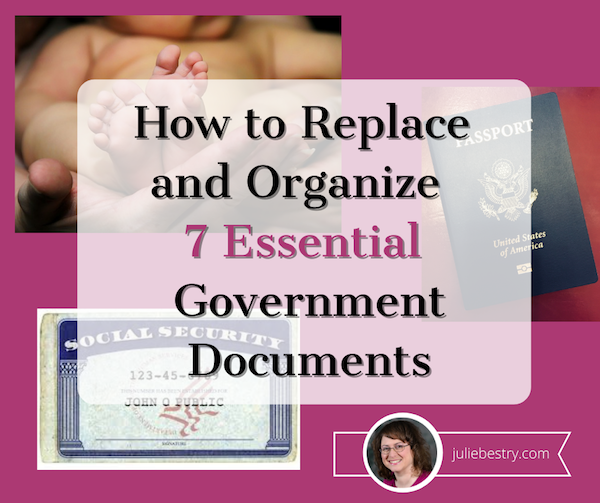
All documents are not created equal. If you lose your electric bill, you can log into your account, and then view, pay, and even print a copy of your bill. Other items fall into the Very Important Paper, or VIP, category, and require more effort to replace. These are the documents without which we cannot pass GO or collect 200 (or any) dollars unless we present an original, certified copy.
The Search for Vital Documents
While stuck at home, numerous clients and friends have been reporting on the states of their files and important documents.
A few months ago, in anticipation of the world returning to “normal,” a client wanted to make plans for a big post-quarantine trip. Although she hasn’t traveled outside of the country in decades, quarantine left her feeling claustrophobic and she’s eager to explore the world. But her passport is both expired and (unfortunately) missing.
Elsewhere, a reader had seen my blog post, Paper Doll On Narwhals, Fake News, and How To Get A REAL ID from last February, and wanted to get a REAL ID so she’d be able to fly domestically. (As a reminder, that deadline has change from October 2020 to October 2021.)
Both would need their birth certificates. Like many people, neither had needed one since applying for driver’s licenses as teens. One couldn’t find hers; yes, that was the one who also lost her passport. The other knew it was somewhere in her elderly parents’ home but couldn’t risk traveling during COVID to acquire it, nor could she accurately direct her parents to find it or trust the (lately chaotic) postal service to deliver the vital document if it were found.
Another client had received a notice that a company related to one of her late father’s stock holdings had liquidated, and the remaining value had been escheated. This means that having lost sight of his correct address when he moved from his longtime home to a nursing home, the transfer agent for the stock sent the check to his state’s unclaimed property division. To prove that she had a right to that amount, my client had to provide the state with her father’s death certificate and a copy of the will, showing that she was a beneficiary.
When my own father died, to prove Paper Mommy‘s right to certain veteran’s survivor benefits, we had to provide his military separation papers dating from World War II. Luckily, I had located these during the process that went into writing The Great Mesozoic Law Office Purge of 2015: A Professional Organizer’s Family Tale.
Replacing the Documents
As a Certified Professional Organizer, I’m often working with clients, sorting through random piles of papers. Wedged between expired car insurance declaration pages and outdated kindergarten registration paperwork, I’ll find some essential VIP and a client will exclaim, “I’ve been LOOKING for that!”
Whether you want to get benefits or insurance, travel or remarry, obtain a job or live happily ever after (whatever that means to you), you’re going to need to produce certain government documents. And if you don’t have them, you’ll need to replace them to make life easier for yourself and your loved ones.
1) Birth Certificate
You’re reading this, so you’ve already been born. (I mean, unless you’re a time traveler, in which case, howdy, and please leave a comment below about the winner and score of the upcoming Super Bowl!) Further, as you were born in the 20th (or 21st) century, you almost certainly already have a birth certificate, even if it’s not in your possession.
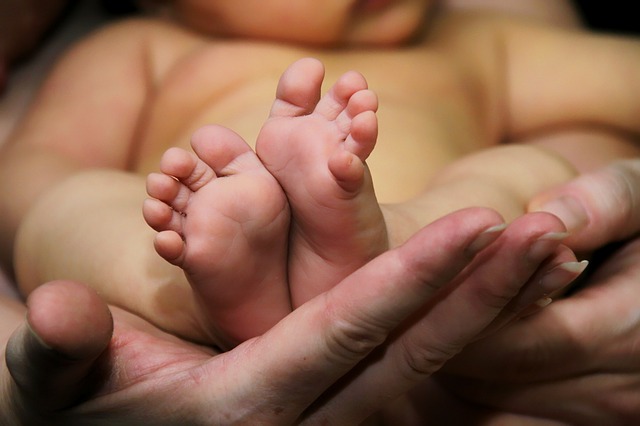
Image by Bruno /Germany from Pixabay
Why you need one: A birth certificate is not merely proof of your arrival on the planet. You need one to get a driver’s license, apply for Social Security and other government benefits owed to you, obtain a passport, join the military, and perhaps prove the date and location of your birth to show you are eligible to be a congressperson, senator, or President of the United States.
Usually, a photocopy will not suffice; you’ll need an embossed (bumpy) certificate, stamped by a government entity related to your place of birth. That might be your county clerk, the registrar of records, or someone else.
If you were born in the United States, contact the office of vital records for your state or territory of birth in writing.
First, visit the Center for Disease Control and Prevention’s National Center for Health Statistics. Through that site, you’ll find information regarding to whom (and at what address) you must write, the fee schedule (for as many copies as you need, plus postal and processing charges), and what information or proof you’ll need to submit. Fees are determined by locale; to get copy of a birth certificate from Guam, it’s only $5; for New York State (outside of New York City), it’s $30. (For New York City, it’s $15, which this Buffalonian considers an unfair discount.)
If you were born abroad to American parents, your birth would have been registered with your nation of birth’s embassy or consulate. If everything is hunky-dory, instead of a standard birth certificate, they would have been given Consular Report of Birth Abroad (CRBA) and you can request a copy from the U.S. Department of State. If they can’t locate your CRBA, or your birth wasn’t registered with an embassy, but you were born on a military base, you can try to contact the hospital where you were born.
If you were born abroad, even if you were adopted by a family in the United States, you won’t have an original U.S. birth certificate; you’ll have to contact the nearest embassy for that nation for assistance. If you were born “on the high seas,” on an aircraft, or in the Panama Canal Zone, you’ll want to read this page for special guidance. (You’ll also want to record your mom telling the story of how that came to be for the delight and amazement of future generations!)
If you were born in Canada, contact the vital statistics office for your province of birth.
To replace your birth certificate, be prepared to provide identifying details, including:
- your full name at birth
- date of birth
- sex (as assigned at birth)
- county and/or city of birth
- hospital name
- your *mother’s complete (including maiden) name, and
- your *father’s complete name
*In the future, it will be more likely that birth certificates will indicate parents names without assuming parents of two genders; currently, however, most locales show these as gendered categories.
You’ll also have to supply your signature (possibly notarized, depending on your state’s requirements), your mailing address, and your phone number.
If you are pressed for time, there are third-party services, like Vitalchek, that can expedite the process for an added cost. (Be sure to do a deep-dive to verify that any expediting service is on the up-and-up.)
2) Social Security Card
Why you need one: You need proof of your registration with the Social Security Administration in order to get a job, accrue benefits, and receive certain government services. Your parents probably completed the paperwork for your Social Security card when you were a newborn, so like a birth certificate, someone has already done the hard work for you. (If you are over the age of 12 but have never received a Social Security card, you will have to apply in person at your local Social Security office.)
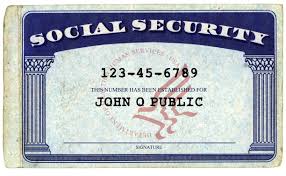
You should already have your Social Security card; you would have needed it to apply for your first “grownup” job. However, if you’ve lost it at some point, you can replace it in one of two ways.
The standard method is by completing an SS-5 application, available online at the Social Security Administration’s website. You will have to print the application and then mail it to your local Social Security office. And that’s the first wrinkle – the Social Security Administration halted all face-to-face services and closed their field offices on March 20, 2020 and they have not yet resumed services. Their website states, “However, we are still able to provide critical services via phone, fax and online.”
Happily, you can replace your Social Security card online, provided that you have (or are willing to create) a mySocialSecurity account.
You’ll be happy to know that unlike a birth certificate, driver’s license, or almost any other official document, you can get your replacement Social Security card for free! However, this isn’t a “Get out of jail, free” card for keeping your paperwork disorganized. You are limited to three replacements per year and ten in your lifetime. (Questions #11 and #12 on the application refer to replacing cards for pre-existing Social Security numbers/cards.)
Remember, don’t carry your Social Security card around with you. That’s like carrying a one million dollar bill, and puts you at risk of identity theft. Unless you have been asked to provide your card for an official reason, such as when you are meeting with Human Resources at your new job, keep your card in a safe place, like your fireproof safe at home.
3) Marriage License & Certificate
Are you married? Mazel tov! But do you know where your marriage license and certificate are?

Image by Engin Akyurt from Pixabay
Why you need one (of each): Every state requires a marriage license, the paper that legally authorizes you to get married, and a marriage certificate, to prove the deed has been done. You apply for a marriage license at some point prior to when you expect the ceremony to be. However, depending on your state, your license might expire anywhere from 30 days to a year after you receive it.
Let’s say you got your marriage license on March 1, 2020, expecting to get married two months later, on May 1, 2020. And let’s say licenses in your state don’t expire for six months. Normally, you wouldn’t be too worried. But perhaps due to COVID, your wedding got postponed and your license expired. No problem; you just apply for a new one.
But let’s say that someone accidentally loses your marriage license, or it got accidentally destroyed after the wedding ceremony but before you were able to submit it to your county. (If it wasn’t accidental, Paper Doll suggests couples counseling.) If that happens, you need the officiant (the minister, priest, rabbi, judge, etc. – the person who officiated) to intervene on your behalf. The officiant has to contact the license-issuing office to get a get a duplicate to ensure that your marriage is kosher.
So, your marriage license is what you need in order to get married; a marriage certificate is proof that the marriage ceremony has happened. If you are taking your new spouse’s name, you will need your marriage certificate in order to legally change your name on your driver’s license, passport, and other official documents.
If your name differs from your spouse, proving your legal right to visit in the hospital may be difficult without documentation. (Granted, during COVID, in many places, visitors – even spouses – are not allowed in hospitals right now.) Insurance companies might require a copy of the certificate to provide spousal coverage, and proof of your marriage is required for everything from qualifying for military housing to obtaining pension benefits to adoption and travel abroad.
The point is that unless you are a character on Grey’s Anatomy, a Post-It Note of marital promises isn’t going to cut it.

If you’re already married, but you trusted your spouse to file the marriage certificate safely away, and your spouse trusted you to do the same (great trust levels, not-so-great organizational skills), you can use the same CDC link provided for birth certificates to identify your state’s office of vital records and see the fees and requirements for requesting copies. You might also take this opportunity to speak with a professional organizer about the best system for organizing your family’s paperwork and maximize future joy.
4) Divorce Decree
Why you need one: Certified copies of divorce decrees are necessary if you wish to remarry, to provide proof of legally separate finances to a tax authority (like the IRS or the state) or a creditor, and to be a contestant on a TV show like The Bachelor. (But please, don’t do that.)
If you’ve lost your divorce decree paperwork and live in or near the county in which the divorce was granted, the fastest method will be to arrive at the county courthouse with the following information in hand:
- the full name of both spouses (including any maiden names) as of the wedding date
- the court case number
- the exact date of the divorce
- and the city, county, and state in which the divorce took place
If you don’t have the court case number, you will need to call one of attorney(s) and/or mediator who handled your divorce to see if their records include the case file number. With this information, you’ll be able to fill out an official request form at the courthouse.
If you no longer live in or near the county in which the divorce occurred, follow the CDC link for the state in which the divorce took place, and follow your individual locale’s instructions.
5) Military Separation/Discharge Papers
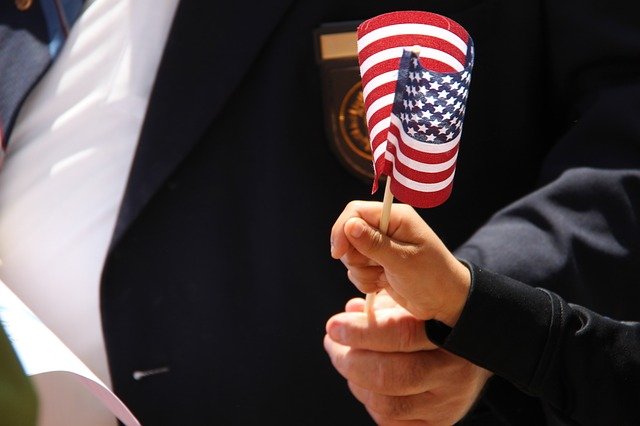
Image by Shonda Ranson from Pixabay
Why you need them: You’ll need your own military records and separation/discharge papers to obtain a job or a security clearance, get proof or copies of medals, or apply for medical or disability benefits. If a relative who served has died, you’ll need certified copies of these records to arrange a military funeral or obtain certain survivor’s benefits.
An original signature of the veteran (or his/her next of kin) is required to fill requests for copies of Official Military Personnel Files (OMPF). To a get a free copy of your (or your relative’s) Report of Separation (DD Form 214) or other military records, start with the electronic search/request system eVetRecs, or mail (or fax) a standard form SF-180 to the National Personnel Records Center.
And here’s where there’s another wrinkle.
Due to COVID, the National Personnel Records Center is closed except for emergencies, and they state on their site:
While we remain in this state, we will continue servicing requests associated with medical treatments, burials, and homeless veterans seeking admittance to a homeless shelter. Please refrain from submitting non-emergency requests such as replacement medals, administrative corrections, or records research until we return to pre-COVID staffing levels.
In other words, unless you are seeking a DD214 so that a veteran can get healthcare or space in a homeless shelter, or to facilitate a veteran’s burial, you may have to make a note on your “To Do After COVID” list for replacing these documents.
6) Death certificate
Why you need one: After someone dies, you will need multiple certified embossed copies of a death certificate for almost everything, including:
- canceling cell phone and utility contracts
- closing an estate
- transferring car titles
- notifying financial institutions regarding debts
- transferring ownership of tangible and intangible property to beneficiaries, and
- other legal, financial, and real estate transactions
If someone has recently died, it is easier and more convenient to acquire death certificates from the funeral home, which generally maintains ongoing relationships with local government offices. In most states, there is a standard fee for acquiring a death certificate, and ethical funeral homes should acquire and pass along requested copies of the death certificate charging an additional fee.
If you need to acquire a death certificate for someone whose passing was not recent, and getting the assistance of the funeral home is not applicable, the procedure is similar to other obtaining copies of birth and marriage certificates. Select your state from the CDC listings for your Office of Vital Records and follow the instructions for your state.
7) Passport
Right now, international travel is an iffy proposition and even where travelers are welcome, many new rules abound, but it can’t help to dream about traveling the globe when all is calm again.
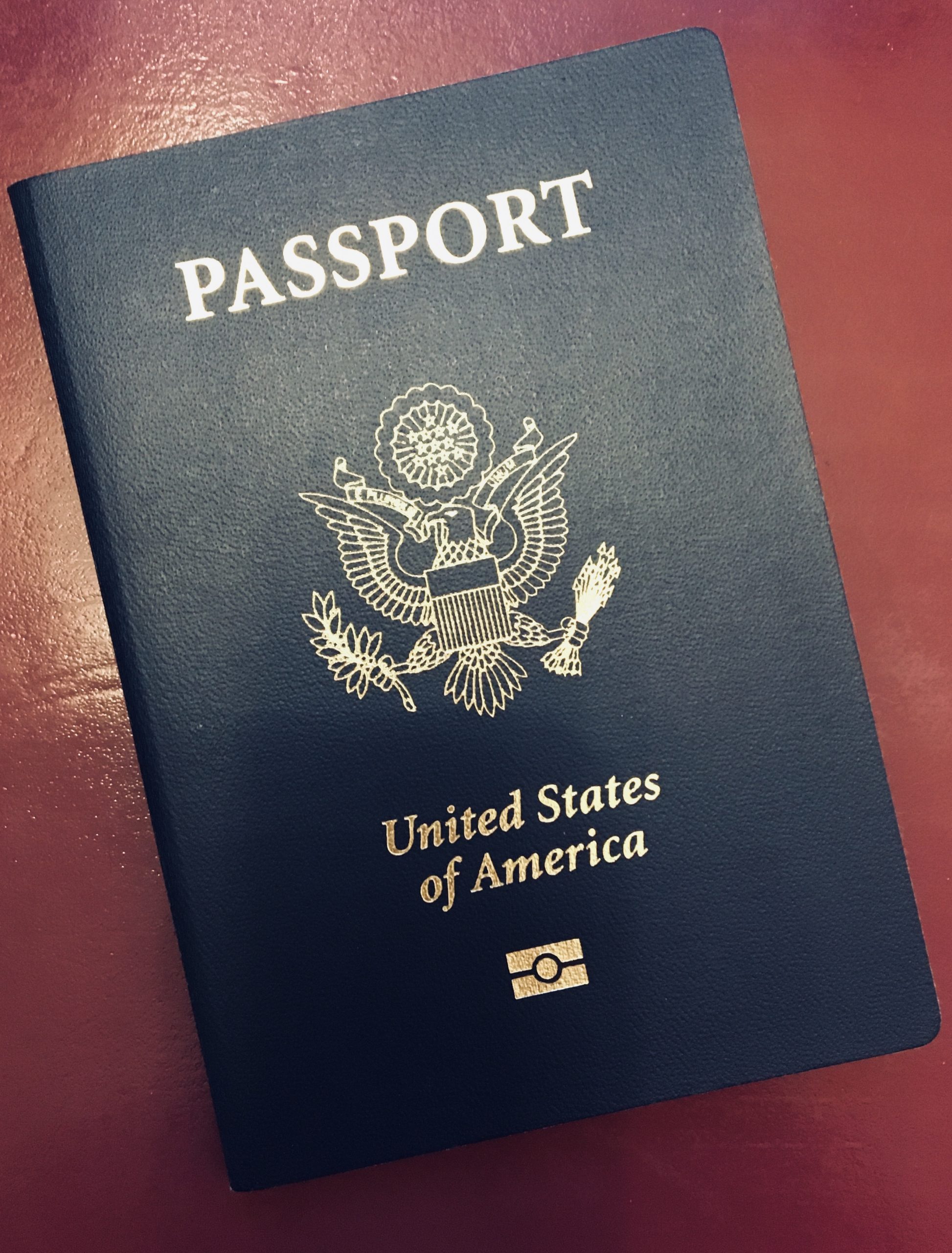
Applying for a new passport still requires some of the process to be completed in person. However, much can be accomplished online, including downloading forms, calculating fees, and getting information about your passport’s application status.
To apply for a new passport, download form DS-11 and read the general instructions at the Department of State web site.
If your passport is lost or stolen, you’ll have to report it. Fill out a DS-64 and then submit it, along with a DS-11, to get a replacement.
To renew your passport by mail, whether it has expired or not, fill out a DS-82 and submit it, along with your old, undamaged passport and required documentation. However, if your expired passport is more than 15 years old, you will have to apply for a new one; if your prior passport was issued before you reached the age of 16, you will have to apply anew. And, you may only renew your passport if it was issued in your current name; or if you can provided legal proof of your name change.
The Department of State has a section explaining delays related to COVID.
What to Do When You Get Your Replacement Documents
Once you spend time and effort replacing a government document, you don’t want to have to do it again. Do the following:
- Scan a copy of your vital documents.
- Provide a scanned and/or paper copy of each of these vital documents to a trusted friend or relative so that if your copies are damaged in a fire or natural disaster, you will at least have some guidance regarding the information contained in them.
- Place your official, embossed (bumpy) paper copies somewhere safe and logical, like a fireproof safe. If you have multiple copies, you can keep extras in a VIP folder of your Family Files.
- Create a digitized index of all of your VIPs so you know what you have. Share a copy with your trusted friend so that, in case of an emergency, your friend can help you identify your documents.
- Make a habit that whenever you remove something from your VIP file or safe, set a reminder on your phone to return it to its proper place. Even if you have to keep snoozing the reminder, it will ensure you put the document back. Otherwise, you’re likely to put it down instead of putting it away, making it more likely to get lost or misplaced again.
A Final Note
Unfortunately, with many of the procedures listed, you may hit speed bumps related to COVID. Many governmental offices are closed, and those that are open often have reduced hours and accessibility. These links and instructions are starting points for official channels; if you hit a road block, you may find assistance by calling your county clerk’s office to seek guidance.




WOW! Thanks for gathering all this information. Great minds think alike. I am going to share a DIY how-to organize these documents in a fireproof safe this Friday. =) I’m going to share your post on all my social media pages as an introduction to that DIY project.
Thank you, Sabrina! I was surprised to find that it had been 12 years since I’d written about these items in this way, and it was definitely time for a refresh. This piece was on the government documents, and I figure I’ve got a few more pieces on this, including documents we have to create for ourselves (POAs, wills, etc.) and then a refresh on how/where to keep them, so I’m sure I’ll be linking to your post soon enough!
Great, current info all in one place. Thanks, Julie! Even organized organizers (ahem) need to replace one of these documents on occasion.
Heh. So far, I haven’t had to replace my own, but I’ve helped a LOT of people get theirs back to square one. I think the key is that library-like reminder. If you take it out, make sure you get pinged to put it back!
Julie- I love how you love doing research! And you are so good at it, especially with including all the details and options. I’m happy to report that currently, our papers are in order. But you mentioned one thing that might be useful, which we haven’t done- scan and email them to someone in case of a fire or other disaster. That’s a good idea- kind of like having insurance or backing up your computer in the cloud or a hard drive. Saving this post for future reference. Thank you, thank you.
Hee, in college, I used to joke that I would have gladly written term papers for a living. Thank you for your kind words, and I’m glad to know all your paperwork is in order, but I didn’t doubt it for a minute.
As far as the scanning, if you do nothing else, make sure you scan your interior front page of your passport (with your photo and info); if your passport is lost or stolen while traveling, accessing it digitally, even if someone has to fax it to the embassy, will help you reset everything.
Great resource. I’m totally saving this for reference. People never think about this until they have to and then often times, they are panicking.
Thanks! This seemed like a good snow-day project. People can check to make sure they have their documents, and if anything’s missing, they’ll know what to do next.
Julie, this is a masterpiece. Having all this information in one place is a gift. While I haven’t needed it I did have one son, who will remain, unnamed (I don’t know who raised him) call a while back to see if I might have his birth certificate. He is over 50 and no I turned that over to him a long time ago. He was born in a military hospital in Germany.
Oooh, a masterpiece. I like this description! 😉 I suspect this mysterious son has had many opportunities to show his birth certificate over the years – to get a driver’s license, to get a passport, to get other licenses that require proof of age. I’m tickled to think he thought that when he loses things that they magically find their way back to you!
Thanks for sharing this. I’m going through my own paper organizing project right now, and I can happily say I have located the documents that apply to me that you listed above! This is a good reference for future paper organizing projects!
I’m glad you were able to put your hands on all of your documents. Thanks for reading!